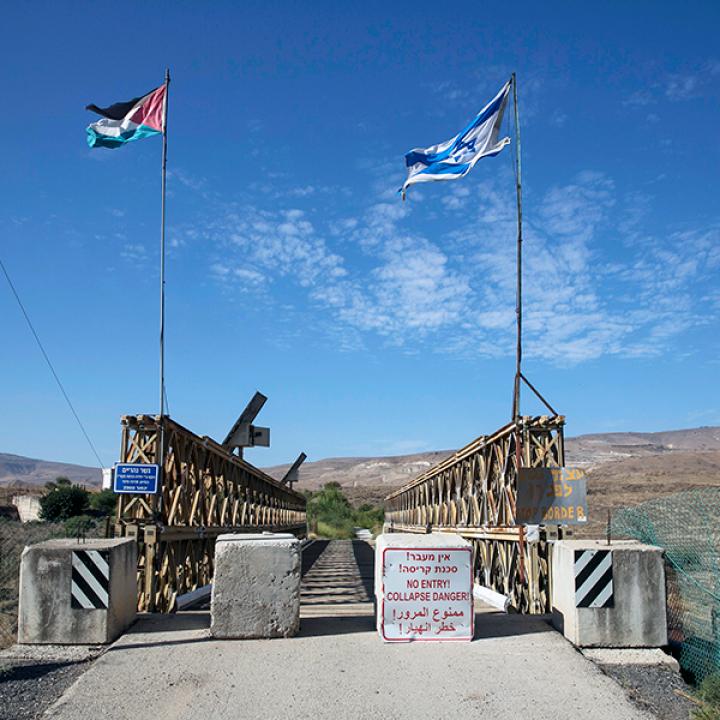

Both countries appreciate the benefits of the bilateral relationship, but the longer the crisis continues, the more problematic quiet coordination will become.
On July 23, an Israeli security guard shot and killed two Jordanians in the Israeli Embassy compound in Amman. In the aftermath of this incident, tensions between Israel and Jordan have spiked, leading to perhaps the most serious bilateral crisis since 1997, when Israel attempted to assassinate former Hamas leader Khaled Meshal in the kingdom.
Details of the shooting remain unclear, but it appears that an argument over payment led a 17-year-old Jordanian furniture assembler to try to stab the Israeli guard with a screwdriver. Responding to the attack, the guard opened fire, killing the assailant and an innocent bystander. Despite the guard's diplomatic immunity, Jordan initially refused to let him leave the kingdom until an investigation was complete but eventually relented and the entire embassy staff departed. A day later in Jerusalem, Israeli Prime Minister Benjamin Netanyahu publicly embraced the guard, a meeting the Jordanian Foreign Minister described as "a disgrace."
Subsequently, Jordan's King Abdullah paid condolence calls to the families of both the innocent victim and the attacker. In an egregious violation of protocol, the Palace also leaked the full name of the guard to the local press, forcing him to flee his home in Israel out of safety concerns. In a statement four days after the shooting, King Abdullah said that Israel's handling of the embassy affair -- and the still unresolved investigation into a March 2014 killing of a Jordanian judge at an Israeli border crossing -- would "have a direct impact on our relations."
The incident could not have come at a worse time for the King. Recent violence surrounding Israel's installation of metal detectors at the entrance of the Temple Mount has spurred anti-Israel demonstrations in the kingdom, where a majority of the population is of Palestinian origin. Worse, just weeks ago, a Jordanian army sergeant hailing from one of the kingdom's largest tribes was convicted and sentenced to life in prison for the murder of three American special forces soldiers at a Jordanian military base last November. For five months after the incident, Jordanian officials inexplicably maintained the soldier's innocence. Ever since, the sergeant's tribe has been protesting, claiming the conviction was a politically motivated capitulation by the Palace to Washington.
In Jordan, where the country's 1994 peace treaty with Israel remains unpopular, many see the release of the embassy guard in the same context -- as a politically expedient concession by the Palace.
The Jordanian media has reported that the Israeli embassy in Amman will not reopen until the guard stands trial. Israel's attorney-general has tasked the police with investigating the shooting, and the Israeli government has hinted that it is looking into paying compensation to the family of the wrongly killed Jordanian. But it's unclear that absent an actual trial, this will be sufficient. Already, 80 members of Jordan's 130-seat parliament are demanding that the Israeli embassy remain closed and that the Jordanian ambassador in Tel Aviv be recalled. It wouldn't be the first time that Amman withdrew its envoy to Israel. In 2008, the ambassador left when Israel began military operations in Gaza; Amman also pulled its representative from 2000 to 2005 during the second Intifada; more recently, in 2014, Jordan's chief diplomat bolted Israel when clashes erupted on the Temple Mount.
Given current dynamics, the eventual departure of the Jordanian ambassador from Tel Aviv is almost assured. More difficult, however, will be the reopening of the Israeli embassy in Amman, which the Palace has now conditioned on a public trial -- and presumably on the conviction -- of the Israeli security guard.
Jordan is a critical U.S. ally in the war against the Islamic State in Syria. And until now, the burgeoning Israeli-Jordanian strategic and economic relationship has been one of the few good news stories in the region. Of particular importance is the robust military-to-military cooperation and intelligence sharing between the states that have helped bolster a Jordanian monarchy increasingly challenged by economic and security threats. The close working relationship has provided Israel with access and insight into the activities of Iranian-backed militias and Sunni extremists in Southern Syria. In addition, Israel sees its heretofore flourishing relations with Jordan (and Egypt) as the sine qua non to normalizing relations with the rest of the Arab world.
Both Jordan and Israel recognize and appreciate the benefits of the relationship and will undoubtedly make efforts to insulate strategic cooperation from the political fallout. Still, the longer the crisis continues, the more problematic this quiet coordination will become.
Washington has a keen interest in preventing a further deterioration of relations between its two best regional allies. The cooperation enhances Jordan's stability, makes Israel more secure, and facilitates the U.S. campaign against ISIS in Syria. It's unclear, based on the seemingly intractable positions adopted in this dispute, whether U.S. diplomacy will be effective. Regardless, the Trump Administration should make the effort and dispatch a senior diplomat -- perhaps the president's peace process envoy, Jason Greenblatt, who has reportedly established a good rapport with both sides -- to try to close the gaps. With or without U.S. intervention, however, it's difficult to see a near-term de-escalation. And with Israel loath to prosecute the embassy guard and King Abdullah unwilling and perhaps politically unable to back down, the crisis promises to continue for some time.
David Schenker is the Aufzien Fellow and director of the Program on Arab Politics at The Washington Institute.



